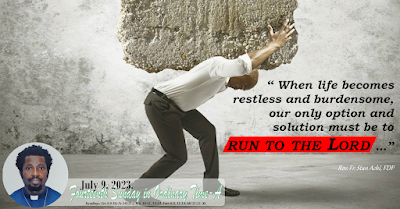THE BURDEN OF GRACE AND LOVE.
July 9, 2023.
Fourteenth Sunday in Ordinary Time – A.
Readings: Zec 9:9-10; Ps 145:1-2, 8-9, 10-11, 13-14; Rom8:9, 11-13; Mt 11:25-30.
“Come to me, all you who labor and are burdened, and I will
give you rest."
A Moroccan proverb says: “The weight of the burden is known
only by him who carries it.” And a Kenya proverb adds: “A heavy burden does not
kill on the day it is carried.”
There are times in life when life itself becomes too tough.
There are moments we do not know what to do to hold on to life. Things start
becoming so hard. In those moments, some people find refuge in vices and
addictions. Some others see no other option than to give up, to literally quit,
or to commit suicide.
During the peak of the COVID-19 pandemic, the rate of
addiction grew vertiginously. Many people, because of being jobless or confined
at home, threw themselves into sexual abuse, pornography, and many other immoralities
related to sex. Some others find their refuge in alcoholism and drugs. The most
regrettable is the increased number of suicides. Many people found no reason to
live. So, death became the only option that was left to them.
Besides all these negative and dark drawings, some other
people gave themselves one of the greatest reasons for life, that is, to find
refuge in God. Though churches were closed, online religiosity and virtual
community gathering busted. Every parish has activated a social media and
Facebook page and holds liturgical service for the thirsty and suffering flock.
Because we realize there was nowhere, we could go, but to God.
Here, the call of our Lord Jesus, in today's Gospel, finds
all its meaning and strength: “Come to me, all you who labor and are burdened,
and I will give you rest...”
When life becomes restless and burdensome, our only option
and solution must be to run to the Lord. With him, we learn the greatest values
we really need for a peaceful and trouble-free life, meekness, simplicity, and
humility. The Lord is always eager to unload all our burdens through his grace
and his unending love. While he takes away our pains, he loads us with love and
many blessings.
In the first reading, the suffering people of God are
invited to rejoice for their king, their liberator is coming. And the Prophet
Zechariah gives the attributes and apparatus of this coming king: "a just
savior, meek, and riding on an ass, on a colt, the foal of an ass..." His
mission, banish all forms of oppression and bring peace to his people.
This prophetic vision finds its fulfillment in Jesus, the
per excellence King of kings, the perfect expression of humility, the Prince of
Peace.
This Jesus, in the Gospel of today, giving thanks to God for
the successful apostolic mission of his disciples, reveals another pang of his
identity. "I am meek and humble of heart." In the Gospels, but also
the whole Scriptures, every time the Lord uses the "I AM", he is
saying something deep about himself and leading us to an Epiphany. Our God, our
Lord is an "I AM" to save and comfort us. He makes himself humble,
meek, and simple, sharing in our humanity to take upon himself our yokes and
burdens and invites us to take his that is light and easy.
We are given here to see that we can only know the Father
through the Son. And in this process of Epiphany, the Lord invites the weary
and burdened to find their rest in him.
Knowing who is our God sets our hearts and minds at peace,
for, we know to whom to run for consolation and comfort. Jesus says: “Come to
me..." This sounds very assuring and releasing.
Somewhere in the Gospel of John, after Jesus spoke to the
people about the bread of life, and made the great claim and revelation of himself
saying, "I am the bread of life..." the crowd stopped following him.
Many departed from him. There, turning to his Disciples, the Lord got a
beautiful answer from Peter, “Lord, to whom shall we go? Thou hast the words of
eternal life..." Jn 6:68-69. To whom shall we go for solace, peace, and
life if not to him?
We can get to know the Lord and run to him only through
humility and by the work of the Holy Spirit. Through the Spirit dwelling in us,
we have come to know the Lord. We thus must live no longer in the flesh but in
the Spirit. Learning the great virtue of humility.
The friends of God, those who are dear to Christ and for who he gives up everything joyfully are the poor, the humble, the marginalized, and the forsaken of our societies. If we wish to be counted among Jesus' friends, we should learn from his humility and simplicity of life. For, he says in the Beatitudes, the poor and simple are blessed and to them belongs the Kingdom of God.





Comments
Post a Comment